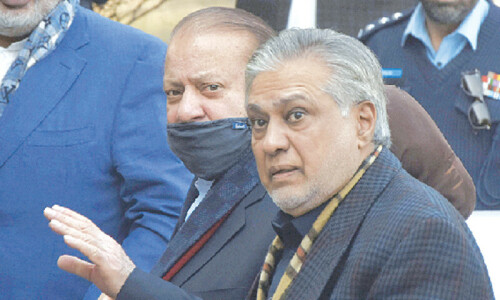• PML-N supremo may now be able to contest polls, legal experts say
• IHC rejects NAB’s request for re-trial, observes ex-PM was convicted on basis of ‘photocopies’
ISLAMABAD: The conviction of former prime minister Nawaz Sharif in the Al-Azizia case — one of the three references instituted against him in light of the Panama Papers — was declared void on Tuesday, as the Islamabad High Court acquitted him despite a National Accountability Bureau (NAB) request for a re-trial.
Following the reversal of his conviction in the Al-Azizia and Avenfield cases, legal experts believe that the PML-N supreme leader may also become eligible to contest polls and hold public office.
During Tuesday’s proceedings, the IHC division bench, comprising Chief Justice Aamer Farooq and Justice Miangul Hassan Aurangzeb, observed that the trial court convicted Mr Sharif upon “evidence based on photocopies”.
While the bench intended to conclude the case on Tuesday, NAB tried to extend the proceedings, with its special prosecutor Azhar Maqbool Shah asking the court to remand the case to the accountability court.
He argued that since the late accountability judge Arshad Malik was removed from service for misconduct, the IHC may send the matter back to the trial court for a decision on merit.
Justice Aurangzeb asked NAB to advance arguments and share the evidence that the bureau intended to submit to the trial court. The IHC chief justice asked the prosecution to show the money trail, any original documents, and proof that Mr Sharif acquired Al-Azizia and Hill Metal Establishment (HME) through corrupt practices.
The NAB lawyer referred to the decision of the Supreme Court to form a joint investigation team (JIT) and said that the apex court had allowed the JIT to utilise the reports and documents submitted during the hearing. He recalled that the Supreme Court directed NAB to prepare and file references against the Sharif family based on the documents placed on the court record.
He said the prosecution relied upon the civil miscellaneous applications submitted to the Supreme Court by Hussain Nawaz regarding the ownership of Al-Azizia and HME. He also cited a copy of the Aldar Audit Bureau and said that the report showed that Hussain Nawaz sent about 80pc profit of the company to Nawaz Sharif through a banking channel.
He further said that the investigation team collected the record from the Securities and Exchange Commission of Pakistan (SECP), Federal Board of Revenue (FBR) and banks, adding that the assets of Nawaz Sharif were disproportionate to his known sources of income.
When the court inquired about evidence to substantiate the claim that Mr Sharif acquired and operated the company, the prosecutor replied it “was a white-collar crime, therefore, there was no direct evidence”.
Mr Sharif’s counsel Amjad Pervaiz argued that the accountability court relied upon documents for evidence, which were submitted by Hussain Nawaz, in violation of the dictum laid down by the superior courts.
According to him, “If the court is to rely upon the evidence submitted by an accused, it must be read in [totality] not… piecemeal.”
He further argued that the evidence of a case cannot be relied upon in another case. According to the counsel, the conviction was based on the presumption of the accountability judge.
The counsel opposed remanding the case back to the accountability court, saying that Nawaz Sharif had filed an application against the late judge Arshad Malik for convicting him under duress and the judge had passed away; therefore, he could not be brought into the dock for cross-examination.
The bench initially reserved judgement after arguments concluded, and announced its verdict after a short break, prompting celebrations among PML-N workers and supporters who had gathered outside the court.
Published in Dawn, December 13th, 2023















































